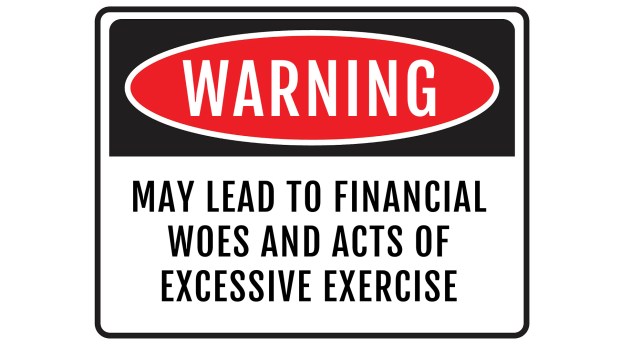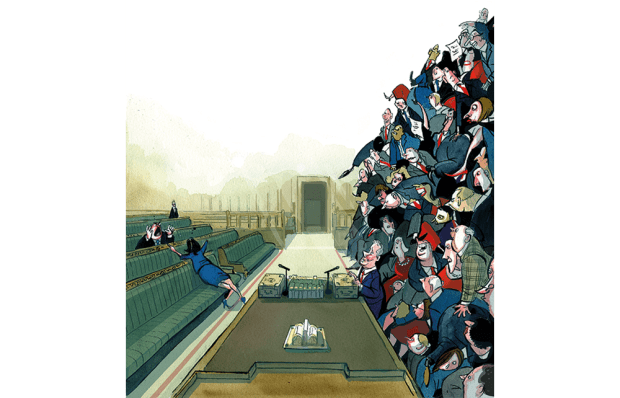Doom and gloom
Sir: The depressing article by Tom Woodman (‘You must be kidding’, 16 October) confirms my growing fears about the damage being wrought by the promoters of apocalyptic climate change, which has become a dangerous cult with alarming echoes of millenarian doom which has stretched through many previous centuries. While sensible care for the environment is a good thing, the descriptions of a frightening future of the imminent end of the world through drought, flood and fire now imbues every aspect of education and politics. Constantly bombarding young people with the news that the end of the world is nigh has led many of them into completely unnecessary visions of death and disaster.
Those convinced by the relentlessly gloomy outlook should try reading some of the opposite viewpoints instead, of which there are many. Those responsible for the propaganda should hang their heads in shame at what they have done and are doing to the mental welfare of younger generations.
Dr Angela Montford
St Andrew’s, Fife
Feeding the world
Sir: Tom Woodman writes: ‘There are just too many of us. It’s estimated that the world population could be too big to feed itself by 2050. More people, in summary, is not what we need.’ We respectfully disagree.
Between 1980 and 2020, the average nominal price of 24 basic food commodities (ranging from bananas to wheat) increased by 35 per cent. Over the same period, the average global nominal wage per hour rose by 412 per cent. That means that the amount of work required to buy one unit in the basket of 24 food commodities in 1980 bought 4.35 baskets in 2020. Put differently, the personal food abundance of the average inhabitant of the planet increased by 335 per cent.
Given that the ‘time price’ (nominal price divided by nominal hourly wage) of food fell by 77 per cent, while the global population rose by 76 per cent (from 4.4 billion to 7.8 billion), we conclude that every 1 per cent increase in global population corresponds to over 1 per cent decline in food prices. On average, every human being creates more than he or she consumes. Those who desire cheaper food should hope for more people.
Marian L. Tupy (Cato Institute)
Gale L. Pooley
(Brigham Young University, Hawaii)
Lovely clutter
Sir: Laura Freeman (‘Whatnots to like’, 16 October) should seek out the Spalding Gentlemen’s Society in Lincolnshire. Affectionately known to some of us as the Spalding Hoarders’ Society, it has been accumulating books and ‘stuff’ since 1710: every available drawer, cupboard, nook and cranny hides a map, magazine, book, doll, flag, poster, clock, medal, coin, manuscript, plate, uniform, assegai, sword… Want to see a Roman sandal found in a fen, browse a full run of original Spectator newspapers, look at a Tompion pocket watch? It’s here.
Jem Bowkett
Spalding, Lincolnshire
My mother the butcher
Sir: My mother, Margaret Western, qualified as the UK’s first woman master butcher in 1956 (‘Bone to pick’, 9 October). When she told her father that she wanted to join her brothers in our family butchers in Gloucestershire, he told her she would have to be twice as good as any man if she was going to succeed, so he sent her to study at the Paris School of Butchery. She was a very fine butcher, widely respected by her apprentices and all in the trade, including at Smithfield. Sadly, she discouraged me from following her more than 30 years later, so congratulations to Olivia Potts for learning butchery. It is wonderful to know that more women are entering the trade.
Philippa Thomas
Newnham on Severn, Gloucestershire
In defence of the defence
Sir: I was surprised to read Prue Leith (‘Letter from Gozo’, 16 October) accuse the Knights Hospitaller of making ‘a poor fist’ of defending Malta from the Turks. Nothing could be further from the truth. The Great Siege of Malta in 1565 — when the Ottoman Empire tried in vain for four months to capture the island — became one of the most celebrated events of 16th-century Europe. Ernle Bradford’s book The Great Siege: Malta 1565 is a must before holidaying on the island.
Admiral Lord West
House of Lords, London SW1
Against the tide
Sir: There are several drawbacks to tidal power (Letters, 16 October). Firstly, it is not as environmental as it seems, as it interferes with the coastal ecosystem, marine life that lives between low and high tides. Secondly, around much of our coast the tidal range is too small to generate much power, in return for the energy and cash input of constructing tidal power stations. Thirdly, many estuaries where there is a large tidal range are also major ports, and constructing new docks facilities would take more materials and energy. Fourthly, some tidal installations are vulnerable to storms by nature of their location. The best form of renewable energy is energy we don’t use, through forgoing unnecessary consumption.
Dr Hillary J. Shaw
Newport, Shropshire
Captive audience
Sir: Andrew Roberts (Diary, 16 October) invites historians to speak to prisoners for his History in Prisons project. Volunteers should beware the dilemma that faced Michael Howard when, as home secretary, he was about to give a speech at Wormwood Scrubs: how to address inmates? ‘Distinguished guests’ seemed inappropriate. Likewise ‘My lords, ladies and gentlemen’. Apparently he settled on: ‘May I say how delighted I am to see so many of you here today.’
Alasdair Riley
London W4
Got something to add? Join the discussion and comment below.
Get 10 issues for just $10
Subscribe to The Spectator Australia today for the next 10 magazine issues, plus full online access, for just $10.
You might disagree with half of it, but you’ll enjoy reading all of it. Try your first month for free, then just $2 a week for the remainder of your first year.














Comments
Don't miss out
Join the conversation with other Spectator Australia readers. Subscribe to leave a comment.
SUBSCRIBEAlready a subscriber? Log in